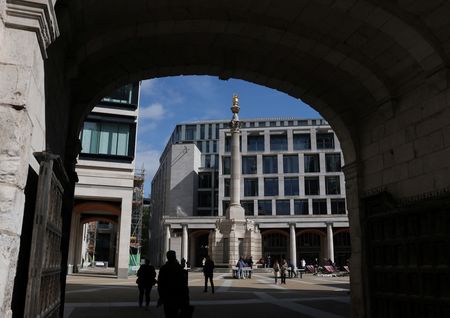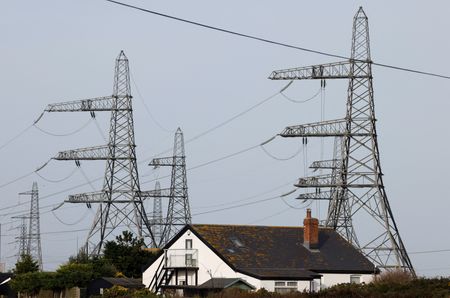By Sanchayaita Roy
(Reuters) -Britain’s benchmark FTSE 100 index closed lower on Thursday after the Bank of England delivered a widely expected rate cut, but a split vote among policymakers stirred investor unease over lingering inflation risks.
The blue-chip FTSE 100 extended earlier losses to end down 0.7%, while the mid-cap FTSE 250 was nearly flat with a 0.06% gain.
The BoE cut interest rates on Thursday but four of its nine policymakers – worried about high inflation – voted to keep rates unchanged, suggesting the central bank’s run of rate cuts might be nearing an end. Sterling rose after the news, which further pressured the export-oriented companies.
“The path from here is less certain, highlighted by today’s knife-edge vote… We see an economy that is starting to pick up but with persistent inflation pressure,” said Vivek Paul, UK Chief Investment Strategist at BlackRock Investment Institute.
“That paves the way for a further 50 basis points of rate cuts by the end of next year, but likely not much more beyond 2026.”
Yields on British government bonds rose on the hawkish voting split. The benchmark 10-year yield was up 1.4 basis points while the rate-sensitive two-year yields rose 5.3 bps. [GB10YT=RR] [GB2YT=RR]
In the market, aerospace and defence stocks led the sectoral decline, down 2.6%, tracking losses in its European peers.
Britain’s BAE Systems and Babcock were among the top losers in the FTSE 100, down 5.6% and 5.8% respectively.
Hikma Pharmaceuticals fell the most in the benchmark index, down 7.1%, after the drugmaker cut the margin forecast for its largest unit.
Energy stocks slipped 2.2% tracking lower oil prices.[O/R] Heavyweight Shell fell 2.8%.
Also on Thursday, U.S. President Donald Trump’s higher tariffs of 10% to 50% on dozens of trading partners kicked in, raising the average U.S. import duty to the highest in a century.
Among other individual stocks, InterContinental Hotels Group (IHG) rose 5.8% after the Holiday Inn owner reported a jump in first-half profit.
Harbour Energy gained the most in the FTSE 250, up 8.9% after the oil and gas producer raised its annual forecast.
(Reporting by Sanchayaita Roy in Bengaluru; Editing by Vijay Kishore)










